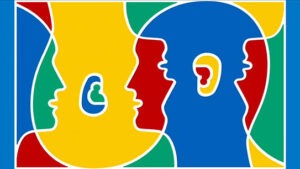
Modern European languages tend to share their names with the places they’re spoken. Swedish: Sweden. German: Germany. And so on. But where’d they come from before that?

Modern European languages tend to share their names with the places they’re spoken. Swedish: Sweden. German: Germany. And so on. But where’d they come from before that?
Modern European languages tend to share their names with the places they’re spoken. Swedish: Sweden. German: Germany. And so on. But where’d they come from before that? One theory is the “Anatolian hypothesis,” Anatolia referring roughly to the Asian part of Turkey. “So the proposal was that it was agriculturalists from the Near East and present-day Turkey and Cyprus who were bringing agriculture to Europe. And that this mass movement of people bringing agriculture, also brought languages.” David Reich, a geneticist at Harvard Medical School.
The Anatolian hypothesis has languages from the Indo-European family hitting Europe around 8,500 years ago. But as with any academic theory, there’s a competing idea: the so-called “steppe hypothesis.” Which says it was herders—not farmers—who galloped in from the grasslands of central Asia five or six thousand years ago, bringing language with them. But the steppe hypothesis was lacking for evidence.
Now Reich and his colleagues have analyzed the DNA found in the remains of 94 ancient Europeans. And this molecular evidence does indeed point to a migration from the steppe into central Europe about 4,500 years ago. “And it’s a massive event—at least three quarters of the population got replaced by people who are never in that part of continental Europe before.” The finding is in the journal Nature. [Wolfgang Haak et al, Massive migration from the steppe was a source for Indo-European languages in Europe]
Of course old bones tell us only so much. “So genetics is of course silent on the languages people spoke and we’ll never be able to figure that out. We can only determine migrations occurred.” But a migration of this scale, he says, surely delivered at least some of Europe’s languages. “Perhaps the languages spoken in parts of northern Europe today”—like the one I’m speaking right now.
—Christopher Intagliata
برای اطلاع از برنامههای اربیتاس در خبرنامه ما عضو شوید
ما وبسایت کوچینگ ، مشاوره و راهبری زبان انگلیسی و زبان های خارجی هستیم ، هزاران راه و روش برای یادگیری زبان وجود دارد که گاهی ما را گیج و سرخورده میکند ، اربیتاس یار همراه شماست تا با برنامه ریزی و راهنمایی اهداف و نیازهای متناسب شرایط شما را شناسایی کند و شما را به هدف مورد نظرتان برساند
025-37788819
09302115278
09360617463